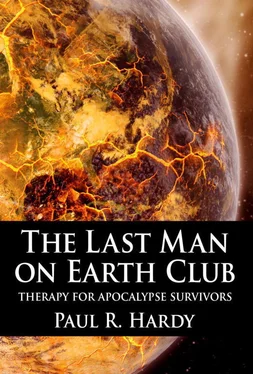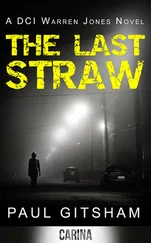“We had these little pagers they put in our hands, I mean they implanted them so we wouldn’t lose them. The idea was that, when it was our turn, they’d go off and we’d get on the ships.” They itched like hell for the first few days. I couldn’t help stroking the spot now; it was still there, and still itched sometimes.
“Somebody figured out how they worked, and tried to jump the queue. But instead of setting off their own pager, they set off everyone else’s. You can imagine what happened.” Hell. Chaos. Thousands of desperate people running out of their tents to get to the ships. All of them crowding around the fences. My parents dragging me along, desperate to get me to Hub.
“There was a crush at the gate. Nobody at the back of the crowd knew it was a false alarm. Everyone at the front was trapped. If they’d opened the gates, people would have been trampled to death as the ones at the back rushed forward. They tried to disperse the crowd and eventually they managed it, but eighty-six people died, including my parents.” They only kept me alive by putting me on their shoulders. They did that with all the children. They passed us forward over the crowd and the IU staff pulled us over the fence. I was screaming when they lifted me over the barrier, trying to get free so I could crawl back over the heads of the crowd, but they were already gone, already pressed to death.
I didn’t cry. I’ve told the story too often, and I always keep some of the details back.
“Why didn’t they turn off the implants…?” asked Liss, appalled.
“They did. It didn’t stop people trying to get in. We were desperate.”
“Was that the worst?” asked Kwame. He wasn’t testing how much I’d suffered; he was genuinely sympathetic.
“No. We had it easy in my country. There’d been a nuclear war between India and China a couple of years before. That’s what persuaded the governments to finally accept the offer of evacuation. We had everything you can imagine before the end.” I shook my head and sighed, and hoped they would not ask for more details. There were mass graves, pandemics, a volcanic winter compounded by the dust thrown up by the nuclear exchange, whole countries abandoned to die.
“So no, I would never have been like you. If it wasn’t for the Interversal Union, I would have been one of the bodies in a mass grave. But I came here instead.”
Here: the evacuation shuttle to the L1 point, weeks in quarantine at Grainger Station with its uneven artificial gravity that children loved to play in, those that weren’t in the terrible silence I withdrew into; then down the Lift, descending on a carbon strand to the equator, and out to a reception centre, and always the therapists worrying about me, trying to get me to play with the other children, putting me in a group with other disturbed ones, wanting us to talk about it. Until finally I did, and the healing began.
The biggest danger when telling this story is becoming lost in reverie. I shook off the memories and looked around the group. By and large, they were sympathetic. I’d shown enough of my own pain to convince them I was no stranger to suffering.
Except for Olivia, of course. She had her arms folded and an obstinate look on her face. “And that proves your point, does it?”
“I may not be a lone survivor, Olivia, but I’ve seen my world die. I saw hundreds of people starve to death before the IU came.”
“Late as ever.”
“I’m still alive because of the IU. And so are you. I’m sorry we didn’t get to you earlier.”
“But nothing—”
“Shut up!” shouted Liss. “You never say anything nice to anyone! It’s like nobody even matters to you if they didn’t suffer like you, we all lost our whole species, isn’t that enough for you?”
Olivia was speechless, for once. She looked around, hoping for support from Pew.
“She’s kind of right,” said Pew, unable to meet her eyes. “You’re not very nice to people.”
“I find your outbursts irritating,” said Katie.
“I find everything about you irritating,” said Kwame.
“Okay, everyone,” I said, “honesty is good but there’s no need to make this about someone’s character.”
“There’s every bloody need!” shouted Olivia, and turned it out to everyone. “You want to know why I’m sick of you? You didn’t fight! You didn’t try! You didn’t have to try! You were the last people on Earth because you were all pathetic! You deserved to go extinct!”
She stormed out of the room, and very shortly out of the building. Pew shuddered as she went. Her words hit him harder than anyone else.
“Veofol?” I asked. He sighed and went after her.
“She has a point,” said Iokan.
“Must you always be contrary?” asked Kwame.
Iokan shrugged. “She’s the way she is because she suffered for longer than any of us. It was twelve years for her… I always knew there was a chance my world would end, but it was quick when it came.” He suddenly remembered himself. “Not that it was a bad thing, of course.”
“There is something admirable in her struggle to survive, if not her personality,” said Katie.
“There’s nothing admirable about her,” said Liss. “She’s just horrible because she wants to be horrible.”
“Did she have any children?” asked Pew. “Maybe she’s angry because she lost her children?”
“She’s never spoken about it,” I said.
“She would hardly be alone in losing children,” said Kwame.
As much as the group had grown closer and gotten to know each other, Olivia was proving to be a problem; she tried to dominate every session while she was present, and was still provoking discussion about her even though she was gone. We were getting nowhere.
“I think that’s enough for today,” I said.
Katie had been unusually garrulous during the group session; you could almost call her restless. And when she retired to her room after the evening meal, the restlessness redoubled.
Normally, she would simply sit on her bench, or lie on it, or sometimes just stand in the middle of the room. But now, if she lay down, she found her head tossing about, unable to find a comfortable place. She sat up, and found her fingers drumming a simple rhythm. She picked her hand off the bench and stared at it, flexing the fingers. She put it aside, and then found her foot doing the same thing.
She stood and walked to the centre of the room. But her body would not stand still. She had to flex her hands to stop them twitching. She tried pacing back and forth, but this did not help either.
She marched to a wall, activated a control surface, selected the room controls and turned one wall into a facsimile of solid steel. Then punched it.
It must have hurt, though there was no expression on her face, and no mark on her fist. The wall was not so lucky: she left an impression of knuckles. She punched it again. And again. And again, until she showed some pain on her face, and her knuckles were scraped. She punched again—
And her fist plunged into foam rubber. She drew it back out of the ruptured surface, and it closed up around the hole she’d made. She tested the wall, still apparently steel as far as the eye was concerned. But it gave way to a firm push. Safety measures had been activated. She would not be allowed to harm herself in her own room.
Her fist trembled. A look of frustration passed over her like a wave, and was gone.
Iokan, meanwhile, was getting a door slammed in his face. “And you can bloody piss off!” yelled Olivia as the door crashed shut. She preferred her door to swing rather than slide, mainly so she could create a satisfying slam.
Iokan sighed, turned away, and had to stop before he walked into Katie. She’d made no noise as she left her room a few doors down and walked up to him. Someone else might have jumped. Iokan was just surprised.
Читать дальше












